
"Unchained Melody" is a 1955 song with music by Alex North and lyrics by Hy Zaret. North wrote the music as a theme for the prison film Unchained (1955), hence the song title. Todd Duncan sang the vocals for the film soundtrack. It has since become a standard and one of the most recorded songs of the 20th century, most notably by the Righteous Brothers in 1965. According to the song's publishing administrator, over 1,500 recordings of "Unchained Melody" have been made by more than 670 artists, in multiple languages.

Alexander O'Neal is an American R&B singer, songwriter and arranger from Natchez, Mississippi.

Gerard Hugh "Leo" Sayer is an English-Australian singer and songwriter who has been active since 1973. He has been an Australian citizen and resident since 2009.

Endless Flight is the fourth album by English singer-songwriter Leo Sayer, which was released in 1976. It was released in the US and Canada by Warner Bros. Records and in the UK by Chrysalis Records.

"Can't Help Falling in Love" is a song recorded by American singer Elvis Presley for the album Blue Hawaii (1961). It was written by Hugo Peretti, Luigi Creatore, and George David Weiss and published by Gladys Music, Inc. The melody is based on "Plaisir d'amour", a popular French love song composed in 1784 by Jean-Paul-Égide Martini. The song was initially written from the perspective of a woman as "Can't Help Falling in Love with Him", which explains the first and third line ending on "in" and "sin" rather than words rhyming with "you".
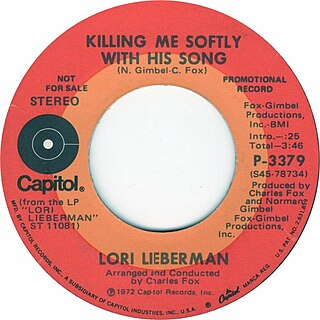
"Killing Me Softly with His Song" is a song composed by Charles Fox with lyrics by Norman Gimbel. The lyrics were written in collaboration with Lori Lieberman after she was inspired by a Don McLean performance in late 1971. Denied writing credit by Fox and Gimbel, Lieberman released her version of the song in 1972, but it did not chart. The song has been covered by many other artists.

"I Will Always Love You" is a song written and originally recorded in 1973 by American singer-songwriter Dolly Parton. Written as a farewell to her business partner and mentor Porter Wagoner, expressing Parton's decision to pursue a solo career, the country single was released in 1974. The song was a commercial success for Parton, twice reaching the top spot of Billboard Hot Country Songs: first in June 1974, then again in October 1982, with a re-recording for The Best Little Whorehouse in Texas soundtrack.
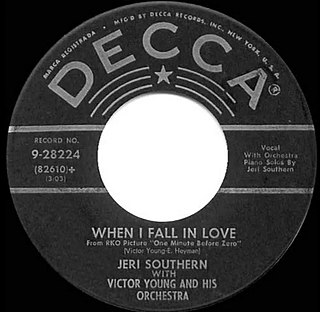
"When I Fall in Love" is a popular song, written by Victor Young (music) and Edward Heyman (lyrics). It was introduced in Howard Hughes' last film One Minute to Zero as the instrumental titled "Theme from One Minute to Zero". Jeri Southern sang on the first vocal recording released in April 1952 with the song's composer, Victor Young, handling the arranging and conducting duties. The song has become a standard, with many artists recording it; the first hit version was sung by Doris Day released in July 1952.

"The Show Must Go On" is a song co-written by Leo Sayer and David Courtney and first recorded by Sayer. It was released in the United Kingdom in 1973, becoming Sayer's first hit record. The song reached #3 on the Irish Singles Chart in January 1974, and was included on Sayer's debut album Silverbird.

"Plush" is a song by American rock band Stone Temple Pilots. It was released as the second single from the band's 1992 debut studio album, Core, in August 1993 and became their first single to top the Billboard Album Rock Tracks chart.

"I Can See Clearly Now" is a song written and recorded by American singer-songwriter Johnny Nash. It was the lead single from his album, I Can See Clearly Now (1972), and achieved success in the United States and the United Kingdom when it was released in 1972, reaching number one on the US Billboard Hot 100 and Cash Box charts. It also reached number one in Canada and South Africa. The song has been covered by many artists throughout the years, including a hit version by Lee Towers that reached no. 19 in the Dutch Top 40 in 1982, and another recorded by Jimmy Cliff for the motion picture soundtrack of Cool Runnings that peaked at no. 18 on the US Billboard Hot 100 in 1993.
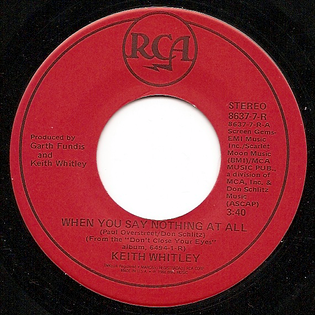
"When You Say Nothing at All" is a country song written by Paul Overstreet and Don Schlitz. It was a hit song for four different performers: Keith Whitley, who took it to the top of the Billboard Hot Country Singles chart on December 24, 1988; Alison Krauss & Union Station, whose version was their first solo top-10 country hit in 1995; Irish singer Frances Black, whose 1996 version became her third Irish top-10 single and brought the song to the attention of Irish pop singer Ronan Keating, whose 1999 version was his first solo single and a number-one hit in the United Kingdom, Ireland, and New Zealand.

"When I Need You" is a popular song written by Albert Hammond and Carole Bayer Sager. Its first appearance was as the title track of Hammond's 1976 album When I Need You. Leo Sayer's version, produced by Richard Perry, was a massive hit worldwide, reaching number 1 on the UK Singles Chart for three weeks in February 1977 after three of his earlier singles had stalled at number 2. It also reached number 1 on both the Billboard Hot 100 for a single week in May 1977; and the Hot Adult Contemporary Tracks. Billboard ranked it as the No. 24 song of 1977. Sayer performed it on the second show of the third season of The Muppet Show.
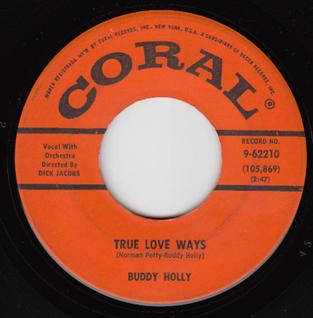
"True Love Ways" is a song attributed to Norman Petty and Buddy Holly. Buddy Holly's original was recorded with the Dick Jacobs Orchestra in October 1958, four months before the singer's death. It was first released on the posthumous album The Buddy Holly Story, Vol. 2, in March 1960. The song was first released as a single in Britain in May 1960, reaching number 25 on the UK Singles Chart. It was released the following month in the US, but did not make the charts. In 1988, a UK re-release of the recording by MCA, the single reached no. 65 on the UK singles chart in a 5 week chart run.

The Very Best of Leo Sayer was a greatest hits compilation album released in May 1979. His seventh album, it was in the #1 spot in the UK Albums Chart for 3 weeks, and in Australia for 1 week. It is his only chart-topper in the UK Albums Chart. It was never released in the United States.

"Orchard Road" is a song by Leo Sayer released in February 1983 as the second single from his tenth album Have You Ever Been in Love. It peaked at number 16 on the UK Singles Chart, becoming his final top-twenty hit until his 2006 feature on "Thunder in My Heart Again".
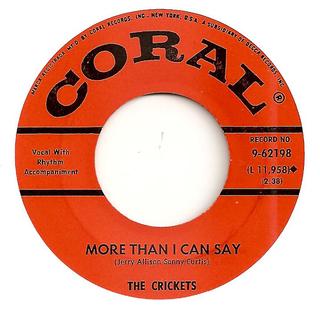
"More Than I Can Say" is a song written by Sonny Curtis and Jerry Allison, both former members of Buddy Holly's band the Crickets. They recorded it in 1959 soon after Holly's death and released it in 1960. Their original version hit No. 42 on British Record Retailer Chart in 1960. It has been notably performed by singers Bobby Vee and Leo Sayer.
Alan Tarney is an English record producer and musician. He was born in Northside, Workington, Cumberland, but spent his teenage years in Adelaide, Australia, where he met his songwriting and musical partner Trevor Spencer. He is best known for his association with Cliff Richard and producing "Take On Me" by a-ha.

"Always and Forever" is an R&B song written by Rod Temperton and produced by Barry Blue. It was first recorded by the British-based multinational funk-disco band Heatwave in 1976. Released as a single on December 3, 1977, the song is included on Heatwave's debut album Too Hot to Handle (1976) and has been covered by numerous artists, becoming something of a standard.
Rozalla Miller, better known as simply Rozalla, is a Zimbabwean electronic music performer who was born in what was then Northern Rhodesia. At the age of 18, she moved with her parents to her father's country of origin, Zimbabwe. She is best known for her three 1991/92 hit singles "Faith ", "Are You Ready To Fly", and particularly "Everybody's Free ", which has been remixed and re-issued several times. In December 2016, Billboard magazine ranked her as the 98th most successful dance artist of all-time.

















